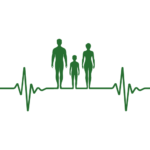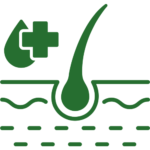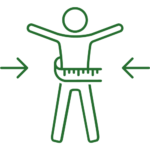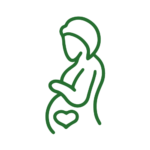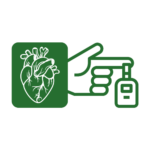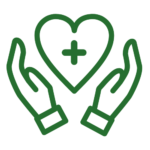WHAT IS IT?
Menopause is a natural biological process in women that marks the end of menstruation.
Some women experience few physical changes during this period of time, or they experience only mild signs and symptoms. Others are bothered by significant changes that can affect daily life. Signs and symptoms that can accompany menopause include:
- Irregular periods
- Vaginal dryness
- Hot flashes
- Night sweats
- Sleep problems
- Mood changes
- Weight gain and slowed metabolism
- Thinning hair and dry skin
Surgery that removes both your uterus and your ovaries causes menopause without any transitional phase. You’re likely to have hot flashes and other menopausal signs and symptoms, which can be severe because the hormonal changes occur abruptly rather than over several years.
Common conditions
Changes in hormone levels that occur with menopause can result in a variety of conditions. Some of the more common conditions associated with menopause include:
Hot flashes. Hot flashes are sudden feelings of warmth, which are usually most intense over the face, neck, and chest. Your skin may redden as if you’re blushing. Hot flashes can also cause profuse sweating and may leave you chilled. Hot flashes are likely related to several factors including changes in reproductive hormones and changes in your body’s thermostat, which becomes more sensitive to slight changes in body temperature.
Urinary incontinence. As the tissues of your vagina and urethra lose elasticity, you may experience frequent, sudden, strong urges to urinate, followed by an involuntary loss of urine (urge incontinence), or the loss of urine with coughing, laughing or lifting (stress incontinence). You may experience urinary tract infections more often.
Changes in sexual function. Vaginal dryness from decreased moisture production and loss of elasticity can cause discomfort and slight bleeding during sexual intercourse. Decreased sensation also may reduce your desire for sexual activity.
Weight gain. Weight gain is common after menopause because hormone changes can slow metabolism.
TREATMENT
Treatment for menopause focuses mainly on relieving bothersome signs and symptoms. Options include:
Hormone therapy. Estrogen therapy is the most effective treatment for relieving menopausal hot flashes, but taking this hormone may increase your risk of other health problems. Depending on your personal and family medical history, your doctor may recommend estrogen in the lowest dose needed for a period of time to provide symptom relief. If you still have your uterus, you’ll need progestin in addition to estrogen to decrease the risk of endometrial cancer.
Vaginal estrogen. To relieve vaginal dryness, estrogen can be administered directly to the vagina using a vaginal cream, tablet, or ring. This treatment releases just a small amount of estrogen, which is absorbed by the vaginal tissues. Estrogen can help relieve vaginal dryness, discomfort with intercourse, and some urinary symptoms.
Low-dose antidepressants. A class of drugs called selective serotonin reuptake inhibitors (SSRIs) may decrease menopausal hot flashes. The medication may be helpful for women who can’t or don’t want to take estrogen or for women who need an antidepressant for a mood disorder.
LIFESTYLE
Prescription medications aren’t necessary to treat bothersome symptoms. Many of the signs and symptoms associated with menopause are temporary and often can be relieved with simple self-care measures.
For hot flashes
To manage hot flashes, dress in layers, so you can easily shed clothes if you need to. Have a cold glass of water when you feel them coming on. Go somewhere cooler, if possible. Try to pinpoint what triggers your hot flashes. For many women, triggers include hot beverages, caffeine, spicy foods, alcohol, stress, hot weather, and even a warm room. Once you know your triggers, try to avoid them or be prepared for how to deal with them.
For vaginal discomfort
To reduce pain and discomfort during intercourse, use over-the-counter, water-based vaginal lubricants (Astroglide, K-Y jelly, others) or moisturizers (Replens, others). Choose products that don’t contain glycerin, which can cause burning or irritation in women who are sensitive to that chemical. Staying sexually active also helps by increasing blood flow to the vagina.
For urinary incontinence
Pelvic floor muscle exercises, called Kegel exercises, can improve some forms of urinary incontinence by strengthening key muscles.
For sleep troubles
There are several things you can do to improve sleep. Avoid caffeine, which can make it difficult to get to sleep. Don’t drink too much alcohol, which can wake you up in the middle of the night. Exercise will help you sleep better, but don’t exercise in the evening before bedtime. If hot flashes disturb your sleep, waking you up during the night, talk to your doctor about treatment to reduce or relieve them.
For weight gain
The best approach for losing weight or maintaining your weight is to eat a healthy diet that includes a variety of fruits, vegetables, and whole grains. Limit saturated fats, oils, and sugars. Exercise for at least 30 minutes most days of the week. In addition to helping you manage your weight, a healthy diet and regular exercise help protect against heart disease, osteoporosis, and other conditions that become more common after menopause.
Excerpt From: The Mayo Clinic. “Mayo Clinic A to Z Health Guide”.
